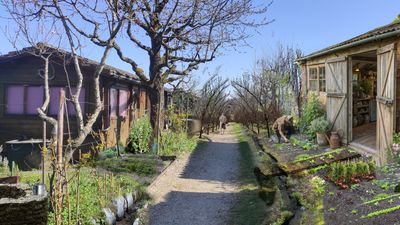Cultivated Urban Slopes: Reimagining the Garden City of FriesenbergLuna Maes, Ranjinee Mallick, and Christina Strantzali
Situated at the foot of the Uetliberg lies Friesenberg. Originating from clusters of farms, extensive orchards, and the first “Garden City” in Zürich, Friesenberg is defined by traces of diverse functions of open spaces, steep slopes, and a legacy of cooperative housing. Now the functions such as housing, recreation or agriculture, are situated on monofunctional terraces organised between streams that come down through the Uetliberg forest into the city. A series of open spaces remain at the forest edge, crucial for climate change mitigation, biodiversity preservation and qualitative recreation.
Faced with an increasing population and ecological challenges such as unpredictable precipitation and rising temperatures, open spaces in Zürich become vital in ensuring its ecological and social resilience. Building on the existing policies of Grün Stadt Zürich, the project proposes a cultivated slope through agroecological porosity. The intention is to create a slope of coexistence through shared cultivation and more-than-human habitats.
The objective is twofold: to strengthen the existing open spaces and areas of cultivation and to extend them into the city. Following the territorial grid, agroecological practices trickle down from the forest edge into the city. The strategies revive past practices of cultivation in Friesenberg while encouraging residents engagement through proximity and identity. The strategies include (1) resilient waterscapes, preventing erosion while guaranteeing water access to gardeners and residents, (2) converting urban surfaces and private gardens into rhizomatic gardens of either collective cultivation or more-than-human habitats, (3) reinstating an orchard necklace at the edge of the forest, extending forest ecosystems and encouraging collective maintenance, and (4) creating extended grazing areas for cattle in existing agricultural fields that extend into residential areas.
The above strategies promote collective maintenance and connection with the land, while enhancing co-existence with more-than-humans. This porous cultivated slope incrementally weaves the slope of Friesenberg into a resilient agroecological fabric of care.
